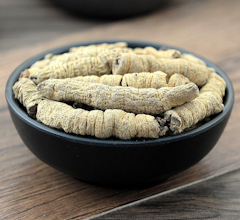Morinda Root
 Morinda Root, also called Indian Mulberry, is a plant and should not be confused with the common mulberry tree. Morinda Root grows widely in warm parts of China and South-East Asia. It has a long history of use in Traditional Chinese Medicine. Morinda Root is widely cultivated in parts of China to prepare herbal medicines. In Traditional Chinese Medicine, its roots are used. Its dried roots are called Ba Ji Tan in Chinese.1
Morinda Root, also called Indian Mulberry, is a plant and should not be confused with the common mulberry tree. Morinda Root grows widely in warm parts of China and South-East Asia. It has a long history of use in Traditional Chinese Medicine. Morinda Root is widely cultivated in parts of China to prepare herbal medicines. In Traditional Chinese Medicine, its roots are used. Its dried roots are called Ba Ji Tan in Chinese.1
For those looking to use this herb, it is essential to understand that this particular herbal extract is poorly known in the west or even outside of China. Therefore, most of its understanding comes from various Traditional Chinee Medical texts and the experience of Chinese herbal medicine practitioners.
Chemical analysis of Morinda Root indicates that most of its health benefits are due to its levels of polysaccharides, anthraquinones, and iridoid glycosides. It also appears to suppress free radical activity.2
Health Benefits of Morinda Root
Below are some of the well-known benefits of Morinda Root:
- Kidney Nourishing
Chronic kidney diseases are on the rise, not due to toxins, but more due to various metabolic disorders like diabetes. Therefore, there is a greater importance of herbs with beneficial effects on the kidneys. In Traditional Chinese Medicine, Morinda Root is described as kidney nourishing and energising. It may have some direct impact on the kidneys and may also help by improving metabolism.2 - Bone and Joint Health
In Traditional Chinese Medicine, Morinda Root is often used to manage osteoarthritis, rheumatoid arthritis and prevent joint related disorders. Early studies show that there is some scientific basis for such use. Some polysaccharides extracted from Morinda Root exert a stimulating effect on bone health. Morinda Root also appears to up-regulate osteogenic genes. Further, the kidneys play a vital role in maintaining bone health, and Morinda Roots are good for the kidneys.3 - Pain and Inflammation
These are two common signs and symptoms in numerous disease conditions, be it arthritis, or metabolic disorder, or even trauma. New studies show that Morinda Root may suppress inflammation and pain.4 - Depression
Mood disorders like depression used to be rare disorders, but nowadays, it is one of the most common health threats. Its prevalence is exceptionally high in older adults. From clinical studies done in China, there is strong evidence that Morinda Root may help balance mood. In one of the clinical trials in humans, researchers found that Morinda Root showed comparable results to the commonly used drugs fluoxetine.5 - Dyslipidaemia
Morinda Root may be suitable for preventing metabolic disorders and cardiovascular issues. Studies show that Morinda Root may reduce bad cholesterol and even help reduce obesity. It may also help prevent atherosclerosiss.6 - Diabetes
Morinda Root helps lower blood glucose and is suitable for preventing diabetes-related complications. Phytocompounds in the root extract, like iridoids and anthraquinones, appear to be responsible for these benefits.7 - Male Sexual Health and Fertility
Morinda Root seems to exert an androgenic effect and thus boost sperm count and health. It may also help improve libido. Therefore, Morinda Root is used in Traditional Chinese Medicine to treat male sexual health issues.8
Side Effects of Morinda Root
Morinda Root is relatively safe and rarely causes any side effects. Although there are no safety studies in the west, there is a vast experience of using this herb in China. Toxicological studies show that it does not cause severe side effects even at very high dosages like 1000 mg/kg, but it may cause unpleasant sensations, irritability, and insomnia in a small number of some cases.2
Properties
- Anti-Inflammatory3,4
- Antioxidant3,7
- Arthritis3
- Atherosclerosis6
- Bone Strengthening3
- Cardiovascular Support2,6
- Cholesterol6
- Depression5
- Diabetes / Blood Sugar7
- High/Good Levels of Phytochemicals / Phytocompounds1
- Kidney Support2
- Libido & Sexual Performance8
- Mood Stabalising5
- Pain Relief4
- Weight Loss / Management6
References:
- Wang J, Xu S, Mei Y, et al. A high-quality genome assembly of Morinda officinalis, a famous native southern herb in the Lingnan region of southern China. Hortic Res. 2021;8(1):1-16. doi:10.1038/s41438-021-00551-w
- Zhang J-H, Xin H-L, Xu Y-M, et al. Morinda officinalis How. - A comprehensive review of traditional uses, phytochemistry and pharmacology. J Ethnopharmacol. 2018;213:230-255. doi:10.1016/j.jep.2017.10.028
- Jiang K, Huang D, Zhang D, et al. Investigation of inulins from the roots of Morinda officinalis for potential therapeutic application as anti-osteoporosis agent. Int J Biol Macromol. 2018;120:170-179. doi:10.1016/j.ijbiomac.2018.08.082
- Choi J, Lee K-T, Choi M-Y, et al. Antinociceptive Anti-inflammatory Effect of Monotropein Isolated from the Root of Morinda officinalis. Biol Pharm Bull. 2005;28(10):1915-1918. doi:10.1248/bpb.28.1915
- Efficacy and safety of Morinda officinalis oligose capsule in the treatment of depression--《The Chinese Journal of Clinical Pharmacology》2011. Accessed October 7, 2021.
- Mandukhail SR, Aziz N, Gilani A-H. Studies on antidyslipidemic effects of Morinda citrifolia (Noni) fruit, leaves and root extracts. Lipids Health Dis. 2010;9(1):88. doi:10.1186/1476-511X-9-88
- Kamiya K, Hamabe W, Harada S, Murakami R, Tokuyama S, Satake T. Chemical Constituents of Morinda citrifolia Roots Exhibit Hypoglycemic Effects in Streptozotocin-Induced Diabetic Mice. Biol Pharm Bull. 2008;31(5):935-938. doi:10.1248/bpb.31.935
- Wu Z-Q, Chen D-L, Lin F-H, et al. Effect of bajijiasu isolated from Morinda officinalis F. C. how on sexual function in male mice and its antioxidant protection of human sperm. J Ethnopharmacol. 2015;164:283-292. doi:10.1016/j.jep.2015.02.016
